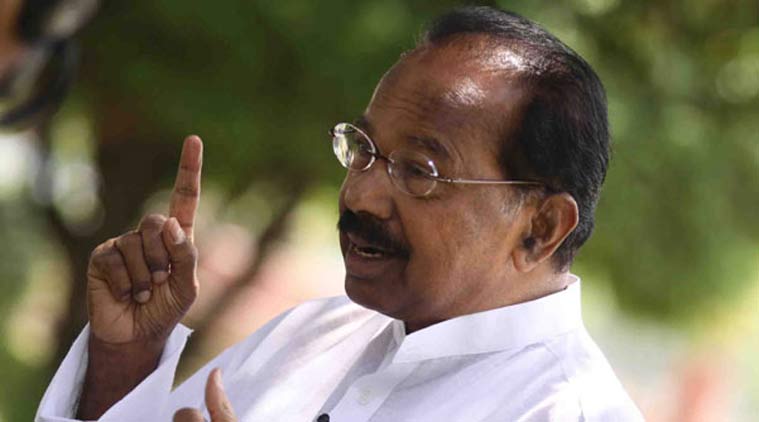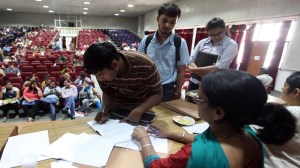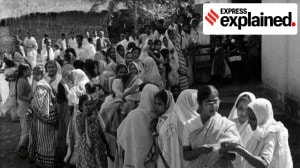- India
- International
His party cautious, Moily says triple talaq practice needs reform
He said religions will have to introspect and reform in every field “civilisation warrants” and “triple talaq is one such area where reform is necessary”.
 Veerappa Moily
Veerappa Moily
A day after the All India Muslim Personal Law Board slammed the government for its stand on the practice of triple talaq, Congress leader and former Law Minister M Veerappa Moily Friday asked the Muslim community to “think of reforming themselves” so that the “axe of law” does not fall on them. He said religions will have to introspect and reform in every field “civilisation warrants” and “triple talaq is one such area where reform is necessary”.
Moily’s party has been cautious about taking a stand on the triple talaq issue, realising it could be on a slippery slope, especially in Uttar Pradesh where assembly elections are due early next year. The Congress merely said it has full faith in the Supreme Court which has always safeguarded rights of women.
Maintaining “it is impossible to implement” a uniform civil code “in a multi-cultural, multi-racial and multi-dimensional country like India”, Moily, however, told The Indian Express that rigid practices should change as time advances.
“Any reform in any religion will have to come from within. It is always difficult to impose it by law. I think as civilisation advances, each one and each religion will have to introspect and make reforms in whichever field civilisation warrants. I don’t think we can have very rigid practices. Triple talaq is one such area where reform is necessary,” he said.
“It is a question of humanity. Having three wives, I don’t think, any religion can propagate it. Even in so far as Islam is concerned, they are also not propagating it. Many Muslim countries don’t practice triple talaq… So, instead of waiting for a public debate and waiting for a law to tell us what should be done, it is high time our Muslim brothers and sisters think of reforming themselves, so that the axe of law will not fall on them,” he said.

On the uniform civil code, Moily said it was not implementable. “It is impossible to implement it in a multi-cultural, multi-racial and multi-dimensional country like India. And anybody who thinks it is a communal agenda, then they are wrong. This cannot be a Hindu-vs-Islam or Islam-vs-Hindu. Multiple practices are available… Any number of tribals we have in the country, they have their own personal laws. Many of the backward classes… for example, some of the families, in fact a majority of the families in my district that is Dakshina Kannada, and Udupi and also in coastal Kerala, we have the marumakkathayam (matrilineal inheritance) practice… through a uniform civil code, you cannot bulldoze them,” he said.
He said the uniform civil code cannot just be viewed in the context of Muslims. “This is a question of practices of many communities, hundreds of communities in India. So when you address uniform civil law, you cannot just limit it only to Muslims. Or the Hindus only. Hindu, as such, is not a religion in our country. Hindu consists of components of various communities… So there is no such thing… a clear demarcation of Hindu vs Muslim. Within Hindus, there are many practices. It has to be acknowledged.”
“Even though, we have incorporated it in the Constitution of India… we could not implement it. Many debates have taken place. It is not the first time the Law Ministry has come out with it. Even during B R Ambedkar’s days as Law Minister, he wanted to do this. But he could not do it. Because the social landscape is such… the country should think of its priority. If you really want to reform the country socially, the first thing to be addressed is a casteless society. If you are bold, as a reformer in Hindu. Hindus should also be very reformative,” he said.
“Peaceful reforms have taken place in the past. Many bad practices like Sati have been given up. But there are still more fundamental bad practices like casteism. Basically, our Hindu society itself is unequal. Suppose, had Buddhism prevailed all over the country, casteism would have gone long back. But Buddhism was resisted only for these reasons. So that is why today we need to think of creating an equal society. Equal society cannot be done by enforcing a law like uniform civil code. And ironically, we often call it is not a union of states, but a union of castes. It is true also… I don’t think uniform civil code is a priority today,” he said.
Hitting out at the BJP, he said the ruling party wants to “communalise” the country to hide the government’s “failures” on development, defence and economic fronts. “So they think that for UP, they have issues like this. Even though they know very well that it cannot be implemented. They will not do it. This is not the first time these debates are coming up. It has been debated and debated and put to rest. People should understand the game of the present government. There is no sincerity on their part. They believe in fragmentation of society, not unity of society,” he said.
At the Congress briefing Friday, party spokesperson Shobha Oja avoided taking a stand. “As far as triple talaq is concerned, the matter is sub judice. And we have full faith in the Supreme Court. The Supreme Court has always safeguarded the rights of women of our country. So we will wait for the decision of the Supreme Court. We have full confidence in the Supreme Court,” she said.
Apr 24: Latest News
- 01
- 02
- 03
- 04
- 05






































